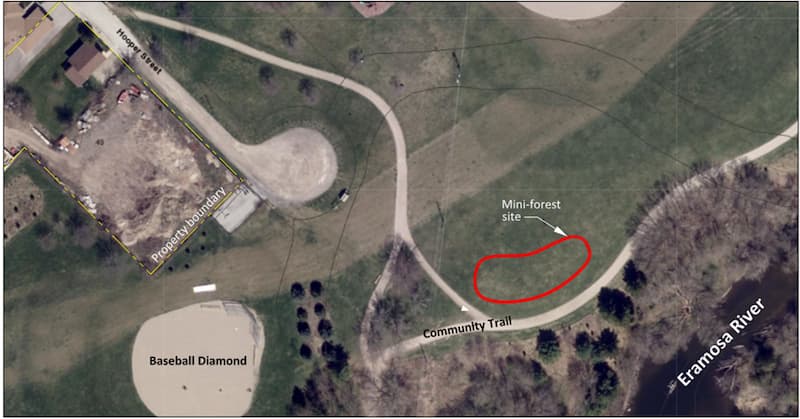On this page
Learn about Guelph’s first mini forest project and get inspired to start your own!
What is a mini forest?
Mini forests are small, densely planted, diverse collections of native tree and shrub species representing all layers in the forest, from the tree canopy to groundcovers that live on the forest floor.
The mini forest technique is inspired by Japanese botanist Akira Miyawaki’s innovative method which was developed over 40 years ago which has since been used all over the world. This method uses higher density and greater species diversity, which results in taller plants in a shorter period than standard techniques.
Where traditional urban tree planting might space trees three metres apart, this technique plants a minimum of three trees per square metre. This technique therefore works out to be 10 times more dense than traditional techniques. Trees and shrubs planted at these sites compete for sunlight, so they grow more quickly.
Mini forests offer an innovative solution in urban areas where space is limited.
Site location

Before

After

Guelph’s first mini forest
Guelph is one of only five pilot communities in Canada in 2023 taking part in the National Mini Forest Pilot project led by Green Communities Canada. Lessons learned from this project will be incorporated into our ongoing naturalization program where we plant close to 20,000 native trees and shrubs each year in parks, public spaces and natural areas, in collaboration with community partners.
In September 2023, approximately 1,300 native trees, shrubs and groundcover plantswere planted with the help of the community at our mini forest demonstration site in York Road Park (at the end of Hooper St.).
Let this project be your inspiration to get involved in caring for nature in your city!
What was planted?
This 500 square metre site was planted with species from the following three groups:
Canopy species (trees)
- Red Maple
- Sugar Maple
- Silver Maple
- Bitternut Hickory
- Shagbark Hickory
- Hackberry
- American Beech
- Black Walnut
- Tuliptree
- White Pine
- Sycamore
- Black Cherry
- White Oak
- Bur Oak
- Red Oak
- Basswood
- Eastern Hemlock
Edge species (trees and shrubs)
- Allegheny Serviceberry
- Round Leaved Serviceberry
- Chokeberry
- Silky Dogwood
- Gray Dogwood
- Red Osier Dogwood
- American Hazel
- Common Ninebark
- American Plum
- Pin Cherry
- Hoptree
- Fragrant Sumac
- Smooth Rose
- Common Blackberry
- Red Raspberry
- Common Black Elderberry
- White Cedar
- Nannyberry
Understory species (trees, shrubs, and groundcovers)
- Blue Beech
- Redbud
- Alternate leaved Dogwood
- Northern Bush Honeysuckle
- Witch Hazel
- Northern Fly Honeysuckle
- Ironwood
- Chokecherry
- Black Raspberry
- Purple Flowering Raspberry
- Scarlet Elderberry or Red Berried Elder
- Mapleleaf Viburnum
- Canada Anemone
- Broad Leaved Sedge
- Bottle-brush Grass
- Woodland Strawberry
- Spotted Cranesbill or Wild Geranium
- Zig Zag Goldenrod
Small forests have big impacts
Mini forests help reduce air pollution, increase biodiversity, and provide much needed habitat for wildlife. They can also provide social benefits such as improved mental and physical health and deepened connections to nature.
Native mini forests are small but mighty contributions to the fight against nature loss and climate change.
The National Mini-Forest Pilot is an initiative of the Network of Nature led by Green Communities Canada, with core funding from Natural Resources Canada’s 2 Billion Trees Program, to support communities across Canada to trial the mini-forest method of tree planting. The program is contributing to Canada’s goal to plant two billion trees by 2030.
Inspired by our mini forest?
Start a small forest in your own backyard, or in a local park as part of our Park Stewards program!

